A New Song Read online
Page 19
“Let Him hide you, Janette, until you gain strength. He will set you upon a rock. Please know that.”
He listened to her quiet, regular breathing. Maybe she really was asleep. He prayed silently for the seeds to fall on fertile ground.
“I’ve marked this psalm for you, the thirtieth. Hear this with your very soul, Janette. ‘Weeping may endure for a night, but joy comes in the morning.’ ”
Without turning in the bed, she raised her hand slightly, and he stood, and held it.
He had gone deep into his pockets with the Wesley bondsman, but Dooley was at home with Harley, and that’s what counted.
“People look at me different,” said Dooley when they talked the following evening. “While I was baggin’ their groceries, I could feel their eyes borin’ a hole in me.”
Dooley’s vernacular always returned when he was angry, tired, or frustrated.
“Maybe. Maybe not. Even in a small town, word doesn’t travel that fast. Just be yourself. You didn’t do anything wrong and you have nothing to apologize for.” Couldn’t he say something wiser, more profound than that? “Keep smiling!” he said, sounding lame and feeling worse.
“Lace’s mama just died,” Dooley said.
“I’m sorry to hear it.” Lace’s mother, ill and failing for years, had never given loving support to her daughter, but had demanded it, instead, for herself. “Have you called Lace?”
“She hates my guts.”
“Call her, send her a card, something. She’s lost her mother and this will be a blow, no matter what the circumstances were. I’ll do the same.”
“I wish . . .” Dooley hesitated.
“Wish what?”
“I wish you an’ Cynthia would come home. Well, I got to go.”
Click.
“Man alive! What’s this?”
“It’s my new iced tea recipe,” said his wife. “Do you like it?”
He raised his glass in a salute. “It’s the best I ever tasted. I didn’t know you could do this.”
“I didn’t, either. I never knew how to make good iced tea. So, with our parish party coming up, I asked the Lord to give me the perfect recipe.”
“That’s the spirit!”
“Do you honestly like it?”
“I never tasted better!” he exclaimed, stealing no thunder from his mother, whose tea represented the southern ideal—heavy on sugar, and blasted with the juice of fresh lemons.
“I woke up yesterday morning and was bursting with all these new ideas about tea. It was very exciting.”
“Hmm,” he said, gulping draughts of the cold, fruity liquid. “Tropical. Exotic.” He swigged it down to the last drop. “Two thumbs up,” he said. “But I’m not sure everybody would understand where the recipe came from.”
She shrugged. “If He gave William Blake those drawings, why couldn’t He give me a simple tea recipe?”
“Good point. What’s in it?”
“I can’t tell you.”
“You can’t tell me?”
“No, darling, I’ve decided to do something very southern—which is to possess at least one secret recipe.” She looked pleased with herself.
“But you can tell me.”
“Not on your life!”
“Why not? I’m your husband!”
“Some well-intentioned parishioner would yank it out of you just like that.” She snapped her fingers.
“No!”
“Yes. And then I’d be in the same boat with poor Esther, whose once-secret orange marmalade cake recipe is circulating through Mitford like a virus.”
“If that’s the way you feel,” he said, slightly miffed.
“Suicidal,” the doctor had said, adding that he had no good idea when she’d be ready to come home.
Father Tim dialed Janette’s cousin, long-distance. No, they really couldn’t take Jonathan, it was all they could do to squeeze in Babette and Jason, they were sorry and hoped he understood, which he did.
He was definitely into the fray of Whitecap, with back-to-back meetings, hospital treks, home visitation, and a series of three talks to Busy Fingers, the needlework arm of the ECW. He was even pitching in once a week with Cynthia to help tour visitors through the church and grounds.
Because of the hither and yon-ness of it all, he usually took the Mustang. This morning, however, he was walking to church, leaving his dog behind to amuse Jonathan. He heard Jonathan’s loud cries from the guest room; the boy definitely wanted his mother.
“I have story hour at the library this morning. It will take his mind off things.” Cynthia nudged him down the steps. “He’ll be fine, dear, just go!”
He went, not knowing what else to do.
As he passed through the gate into the street, he had the sense, once again, that someone was watching him. He shaded his eyes and peered toward the hedgebound, chest-high wall that surrounded his neighbor’s house.
On impulse, he stepped closer to the hedge and called, “Mr. Love! Are you there?”
About two yards to his left, the foliage moved, shook slightly, and was still. What could he lose? If Morris Love was not there, then he was standing here talking to himself. If Morris Love was there, then he was merely being neighborly.
“If you’re there, Mr. Love, I’d just like to say that we—my wife and I—enjoy your music very much.”
“Out! Out!”
The sudden shout through the hedge was loud, hoarse, and furious.
Father Tim stepped back, startled.
“Out!” The command was repeated with even greater ferocity.
The voice sent chills up his spine. Yes, indeed, he’d done the wrong thing in trying to be neighborly.
He trotted quickly down the lane toward Ernie’s, without looking back.
“Junior’s got mail!” Ernie proudly announced.
“Off and running, then!” Father Tim sat down at the table with Junior.
“Lookit,” said Junior, pushing a stack of letters his way. “You can read ’em if you want to.”
He removed the lid from his coffee cup. “Anything promising?”
“See this one?” Junior pointed to the pink envelope that crowned the batch. “It’s th’ best, I’d read that.”
“You sure you want me to read it?”
“Sure!” said Junior. “And I’ll let you see her picture when you’ve read th’ letter. You ain’t goin’ to believe it.”
Ernie thumped down at the table, grinning. “Read it out loud. I’d like to hear that one again.”
“Yes, sir,” said Junior, “read it out loud, that’s what I did.”
“Here goes.” He cleared his throat. “ ‘Dear—’ ”
The screen door slapped behind Roanoke. “How y’all?” he queried the general assembly.
“Fine,” said Ernie. “Set down, th’ preacher’s readin’ Junior’s love letters.”
Roanoke pulled up a chair and sat, taking the lid off his coffee. He had a cigarette stuck behind his ear. “I hope they ain’t too mushy,” he said.
Ernie punched Junior on the arm. “We’re lookin’ for mushy, right, Junior? Go ahead an’ read, Tim.”
“ ‘Dear Serious: I couldn’t believe my eyes when I saw your ad. I truly love Scrabble and fishing better than anything! But I personally don’t like a whole lot of country music except for Loretta Lynn. I have been looking for somebody to go fishing with and have played Scrabble since I was nine years old. It is my favorite. Are you a Christian? This is real important to me. If you are you ought to say so in your ad it could help somebody decide whether to answer or not.
“ ‘If you are and if you are really serious like your ad says you will have to meet my daddy before you can take me out. I am not interested in dirty jokes or cussing. Here’s my picture. I am named for Ava Gardner the movie star who was born in Smithfield the same town as my mother who died four years ago with cancer.
“ ‘Why am I writing a perfect stranger? My sister said to do it especially as Daddy will meet you firs
t. Before it goes that far though send me your picture to the Box Number if you are interested. I am 29 and was married when I was 17 but my husband was killed driving a tractor trailer which lost its brakes on a bad curve in West Virginia. I have my own business and believe in hard work.
“ ‘I also believe that honesty is the best policy.
“ ‘Sincerely yours,
“ ‘Ava Goodnight.’ ”
“Nice letter,” said Father Tim. “Very neat handwriting.”
“Now lookit,” said Junior, taking a photograph out of his shirt pocket.
Father Tim gazed at the photo of a young woman with chestnut hair and a dazzling smile. “I’ll be darned. Beautiful!”
“Where’s she live at?” asked Roanoke.
“Swanquarter,” said Junior, seeming especially proud of this fact.
“That’ll be some mighty long distance courtin’.”
Junior shrugged as Roanoke peered over Father Tim’s shoulder at the photograph. “Looks like you got th’ brass ring.”
“I don’t know. She has her own business an’ all, plus she’s really . . . nice-lookin’.”
“Good-lookin’ is what I’d say,” said Ernie.
“Right. So she prob’ly wouldn’t be interested in . . . you know . . . me, or anything.”
“Wrong attitude!” said Ernie. “You were rarin’ to go ’til you started gettin’ feedback, now you want to crawl off an’ quit.”
“Well, not quit, exactly,” said Junior, looking uneasy.
Roanoke blew on his coffee. “With women, you got t’ fish or cut bait.”
“Right,” said Ernie. “Idn’t that right, Tim?”
“That’s right.” Didn’t he know? Hadn’t he learned? He had cut bait ’til he nearly lost Cynthia Coppersmith for all eternity.
“Write her back,” said Ernie. “You don’t cuss too bad, and I never heard you tell a dirty joke, so you got that covered. Plus you’re both dead set on bein’ honest.”
“Are you a Christian?” asked Roanoke, taking the cigarette from behind his ear. “Seem like that’s pretty major in her opinion.”
“Well . . .” Junior thought about it. “I guess. I mean, my mama went to church an’ all, ’til she died, and I went pretty regular ’til a few years ago.”
Roanoke lit his cigarette and inhaled deeply. “That don’t necessarily cut it,” he said. “I don’t know much, but I do know that.”
“Anyway,” said Junior, “I don’t have a picture.”
“You got a camera?”
“Somewhere I got a camera I won at the fair.”
“Bring it in tomorrow mornin’ on your way to the Toe and I’ll snap you one or two shots,” said Ernie. “I got film over there, we’ll use a roll of two-hundred if th’ light’s not good.”
“Should I wear a tie?”
“I wouldn’t do that. What you got on’ll be fine.”
“Maybe I should wear a cap.” Junior smoothed his hair, which was thinning in front.
“Honesty is the best policy,” said Ernie. “Don’t wear a cap. But hold your stomach in an’ all.”
“I don’t think I should wear what I got on, these are my work clothes.”
Roanoke blew a smoke ring. “She said she believes in hard work.”
Junior was looking increasingly frustrated. Suddenly he turned to Father Tim. “What do you think, sir?”
“Maybe . . . maybe a pair of jeans with a denim shirt and a jacket?”
Junior sighed. “I’ll have to wash m’ jeans and iron a shirt.”
“So?” said Ernie. “Big deal. It ought to be worth a little effort, gettin’ a letter like that from a nice girl. Just remember what some of those other letters said.”
Junior blushed.
The light on his office answering machine was blinking.
Emma, as usual, did not stand on ceremony.
“Seems like things are fallin’ apart up here since you left. I just heard Louella fell and broke her hip, just like Miss Sadie, and she’s in th’ hospital and Hoppy says it’s a good thing she’s well padded because it could have been worse. But if you ask me, practically every old person I hear about who breaks a hip . . . well, I don’t want to say it, but you know what I mean—
“Snickers, stop that this minute! Hold on, he’s chewin’ Harold’s church shoes.” The phone clattered onto the countertop. General mumbling, barking, and door-slamming.
“By th’ way, I been meanin’ to tell you that Uncle Billy’s havin’ knee surgery. I think that’s what he said, my phone has an awful lot of static since th’ storm last week. . . .”
They said their prayers in the darkened room and held each other, talking in low voices lest Jonathan wake up and make his usual midnight invasion.
“I feel we need to run home to Mitford,” he said.
“Run home to Mitford? Darling, you don’t just run home when it’s twelve hundred miles round trip and a hundred degrees in the shade. Dooley will be fine, I promise.”
“It’s not just Dooley. It’s also Esther and Gene and Louella and Lace and . . .” He sighed. “I feel helpless.”
“You want to help everybody and fix everything. But Timothy, you just can’t.”
“I’ve never been able to swallow that down.”
“Remember the sign I have over my drawing board at home? ‘Don’t feel totally, personally, irrevocably responsible for everything. That’s my job. Signed, God.’ ”
“Ummm.”
She kissed his cheek. “I love you to pieces,” she said.
“I love you to pieces back,” he replied, smiling in the dark. He would be in a ditch without Cynthia Kavanagh.
“Listen,” she whispered, “you run home to Mitford and I’ll hold down the fort, OK? I’ve got at least two and a half tons of cookies to bake and freeze, not to mention a hundred miniature quiches and six loaves of bread with sun-dried tomatoes.”
“You’re doing it again, you’re not letting anyone help with the party.”
“Who can help? Marion is at the library practically every day, poor Jean Ballenger couldn’t cook if her life depended on it, Marlene Bragg’s fingernails are so long she can barely get ice out of a tray, and everyone else works.”
“Who’s doing flowers? I know you’ll want them in all the rooms.”
She sighed. “I’d give my French watercolors for a Hessie Mayhew in this parish. But alas, I suppose I’m doing them myself.”
“I’ll order flowers for you, have them delivered.”
“How sweet, but no, I’ll cut what’s left in the garden and plunder Marion’s little plot—you know I love that tousled look for flowers, nothing arranged. Anyway, darling, we’re getting off the point. Run home to Mitford and see Dooley and make your rounds and come back to me.”
“Are you sure?”
“Of course. Go to sleep.”
She patted his cheek and turned on her side and he listened for her breathing to become regular, rhythmic. But it did not. He could feel her lying awake, just as he was doing.
“What is it, Kavanagh? Can’t sleep?” He reached out and touched her shoulder.
“Cynthia?” Good heavens, she was crying.
He pulled her against him and she turned in his arms and wept quietly.
“My girl, my dearest love, what is it?”
“I’m homesick for Mitford, too, but I’ve tried and tried to be brave about it and not let you know. I see you wanting to go and take care of things, and, well, so do I. I mean, I like it here, actually I love it here, but I miss Mitford, I miss our home.”
“I understand.”
“I’m so sorry you’ve caught me out, Timothy. I feel like a criminal, hiding this from you.”
“Thank goodness it’s hidden no more. You’ll come with me, then, we’ll leave first thing next Thursday morning. I’ll get Father Jack to supply, I’m sure he’ll do it, and we’ll head back here on Sunday.”
He might have gotten up and danced a jig.
“Best of all,” he
declared, “we’ll have two days with Dooley before he goes off to school.”
“Lovely!” she said, forgetting to whisper. “I can’t wait to see the big lug. What a dreadful thing he’s going through. Of course, we’ll have to take Jonathan. . . .”
“Of course! They’ll love him in Mitford.”
“He can watch a movie, Dooley has a VCR!”
“Thank You, Lord!” he exclaimed, feeling a slow flush happiness.
“Yes, thank You, Lord!” she said, blowing her nose.
CHAPTER TEN
If Wishes Were Horses
He regretted being unable to introduce their new organist around on Sunday, but Sam and Marion said they’d do it for him.
He called Jack Ferguson.
“Happy to!” exclaimed the retired priest, who was fond of peppering his sermons with ecclesiastical jokes. “I’ll just pop up with Earlene. Maybe you’ll let us stay at your place Saturday night.”
“Absolutely! We’ll leave the keys under the potted geranium by the front door. You know where the church is . . .”
“Oh, yes, I’ve supplied St. John’s several times, always a pleasure!”
“. . . and I’ll fax the directions to Dove Cottage.”
“Super!” said Father Jack. “By the way, have you heard that Ron Cowper is leaving St. Michael’s?”
“I’ll be darned. I thought he was rooted in there like a turnip.”
“One of the parish told him, said, ‘Father Ron, I’m so sorry you’re going, we never knew what sin was ’til you came.’ ”
He chuckled. “Jack, Jack.”
“All true, Timothy. And did you hear about Bishop Harvey’s big trip to Uganda?”
“Briefly, when he was here in July.”
“At the end of a worship service, Bill had a notion to give the blessing in the language of the region. He picked up the printed sheet, made the sign of the cross, then very slowly and solemnly read in Luganda, ‘Do not take away the service bulletin.’ ”
Father Tim laughed heartily. “Thank heaven you don’t know anything to tell on me.”
“Oh,” said Father Jack, “I’ll think of something.”

 A Light in the Window
A Light in the Window Somewhere Safe With Somebody Good
Somewhere Safe With Somebody Good In This Mountain
In This Mountain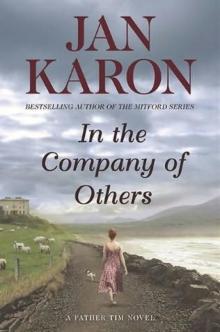 In the Company of Others
In the Company of Others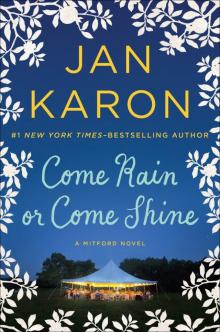 Come Rain or Come Shine
Come Rain or Come Shine To Be Where You Are
To Be Where You Are These High, Green Hills
These High, Green Hills Light From Heaven
Light From Heaven A New Song
A New Song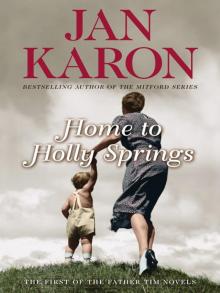 Home to Holly Springs
Home to Holly Springs The Mitford Bedside Companion
The Mitford Bedside Companion At Home in Mitford
At Home in Mitford Shepherds Abiding
Shepherds Abiding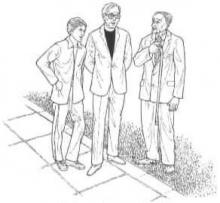 Out to Canaan
Out to Canaan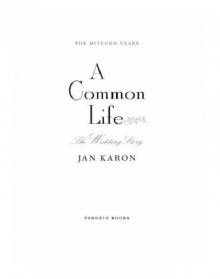 A Common Life: The Wedding Story
A Common Life: The Wedding Story Jan Karon's Mitford Years
Jan Karon's Mitford Years